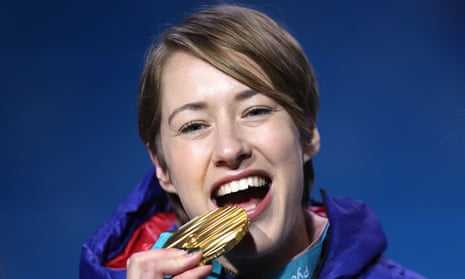It took Lizzy Yarnold four years to weave together the myriad threads required to defend her skeleton title. Yet hours after becoming Britain’s greatest Winter Olympian, not much had changed. For rather than celebrate her champagne moment with fizz, the Yarn settled down with some yarn and knitting needles.
The encouraging news for Team GB is that the 29-year-old is not planning to put her feet up just yet, despite her on/off struggles with motivation and fitness before Pyeongchang. In fact, she has left open the tantalising possibility that she might attempt to secure a third Olympic title in Beijing in four years’ time – once her battered body has enjoyed a long and recuperative rest.
“I feel very motivated today as I did four years ago,” she said. “But I need to get over my chest infection and take a good break. It’s a four-year cycle and, even though it’s tempting and you’re desperate to carry on, it’s a long time to be at your best.”
She would like to skydive, she suggested, and go on holiday with her friend Laura Deas, who snatched an unlikely bronze medal right at the death on Saturday. There was even talk about setting up a soapbox race in her home town of West Kingsdown, given that skeleton is impossible to do recreationally in the UK, but she may have been playing to the gallery with that one.
By the sounds of things, she plans to work on her knitting too. “I’m only doing strips because I can’t do a pattern,” she said. “It’s too complicated. I woke up really early after three hours sleep so I watched the Aussie Murder Mysteries on Netflix and chilled with knitting.
“My nan taught me to knit years ago and passed away two years ago and so it’s a way to feel connected with her.”
Rather than revel in her success she plans to visit more schools to inspire kids to take up sport. “After Sochi, that was my most important thing – I went to 300 or 400 of them in the six months afterwards,” she said. “That’s certainly top my list. I certainly wouldn’t pursue celebrity status.
“My gold medal is like Frodo’s ring – the children’s faces light up. If I can be a role model to them that’s the most important thing.
“And my favourite message is that, whatever you do, playing the clarinet or being an artist, keep going with it and believe in yourself – and learn the lessons of failure. I fail so much more than I succeed.”
Yarnold also addressed the issue that has stubbornly refused to go away during the past week in Pyeongchang: Team GB’s use of game-changing skinsuits to reduce drag and improve aerodynamic performance, as first revealed by the Guardian.
It is obvious from conversations among people in the sport that Yarnold is widely liked and hugely respected by other athletes – not only for the way she drives and carries herself but also for her willingness to speak out on big issues such as Russian doping.
In private conversations, however, it is apparent too that many feel Team GB has pulled a fast one here by using its financial clout and firepower to push the team’s technological edge to its outer limits. However, Yarnold insisted that the team had played fair. “First and foremost it is the skeleton athlete on the sled,” she said. “There are other elements: gloves, shoes, helmet and the skeleton itself. We’ve pushed the tech by finding out as much as we can like any nation. I’d always say the slider has the most impact.”
Unsurprisingly she was supported by Deas too, who insisted: “Tech is a very important part of sport, but you still have to be the best person on the day to win a medal.”
No one doubts that. But there is also no denying the advantages they have enjoyed, either. How could there be? With Britain having won three out of six skeleton medals, the facts are staring us and them in the face.
For now, though, Yarnold understandably craves the simple life again. “Normality is a strange thing when you’ve been away for four or five months,” she said. “When I get to put away my wash bag, that’s a big occasion. I am looking forward to being home, remembering that I’m a terrible cook and asking my husband James to cook the dinner.”
